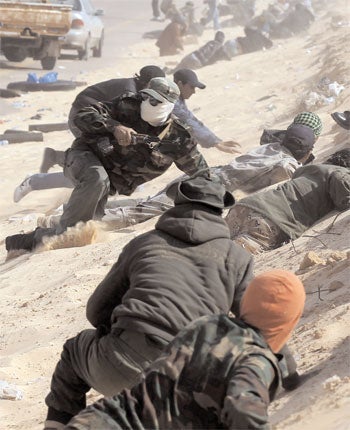Your support helps us to tell the story
From reproductive rights to climate change to Big Tech, The Independent is on the ground when the story is developing. Whether it's investigating the financials of Elon Musk's pro-Trump PAC or producing our latest documentary, 'The A Word', which shines a light on the American women fighting for reproductive rights, we know how important it is to parse out the facts from the messaging.
At such a critical moment in US history, we need reporters on the ground. Your donation allows us to keep sending journalists to speak to both sides of the story.
The Independent is trusted by Americans across the entire political spectrum. And unlike many other quality news outlets, we choose not to lock Americans out of our reporting and analysis with paywalls. We believe quality journalism should be available to everyone, paid for by those who can afford it.
Your support makes all the difference.Nato reached a partial agreement late last night to take over the command of the no-fly zone over Libya, but deep divisions within the alliance mean the US will have to remain in charge of air strikes on Colonel Gaddafi's ground forces.
The decision to run parallel campaigns, with Nato's military headquarters planning missions against Gaddafi's air forces, but a separate US chain of command dealing with ground attacks, will set alarm bells ringing among military planners, given the scope for confusion and duplication it brings.
"At this moment there will still be a coalition operation and a Nato operation," said Nato Secretary General Anders Fogh Rasmussen. "We are considering whether Nato should take on the broader responsibility ... but that decision has not been made yet."
The complex deal appeared to be the only way to persuade Turkey to accept any Nato role. Ankara is opposed to Nato bombing ground targets, fearing civilian casualties in a fellow Muslim nation. In an effort to minimise the confusion, US Admiral Samuel J Locklear is expected to play a key operational role in both command chains.
Since air operations began on Saturday, the mission has been co-ordinated by US headquarters in Germany and Italy, but from the beginning the Obama administration had made clear they wanted the Europeans to take over after the first phase of the operation.
Washington is anxious to avoid being drawn into another prolonged conflict in the Muslim world and wanted to hand over command by early next week to Nato or to a combination of European allies. US Secretary of State Hillary Clinton joined Mr Rasmussen in insisting that Nato will continue to work on the military plans for the alliance's broader role to protect civilians against Libyan ground forces, even without the political agreement for them to do so.
"All 28 allies have also now authorised military authorities to develop an operations plan for Nato to take on the broader civilian protection mission. Nato is well-suited to co-ordinating this international effort," she said in Washington.
Opposition from France and Turkey to Nato taking command has led to a week of acrimonious wrangling at Nato's Brussels headquarters. Aside from the traditional French aversion to Nato, President Nicolas Sarkozy was concerned that putting the anti-Gaddafi operation under a Nato flag will alienate Arab opinion due to the alliance's role in Afghanistan.
One diplomat likened the poisonous atmosphere at allied headquarters to the deep splits in the alliance in 2003 when France and Germany opposed the invasion of Iraq. After meeting David Cameron and other European leaders at an EU summit in Brussels, Mr Sarkozy denied there were splits over the way ahead in Libya.
"Europe is totally united," he said. "Gaddafi cannot count on any divisions in Europe, nor in the coalition." He declined to talk about the Nato decision, beyond saying that the alliance military command would still need to be overseen by a political committee made up of members of the wider coalition.
"The technical, military co-ordination of the operation will be done by Nato, but the political co-ordination will be done by the coalition, that is an agreement between myself with Mr Obama and Mr Cameron," he claimed.

Join our commenting forum
Join thought-provoking conversations, follow other Independent readers and see their replies
Comments